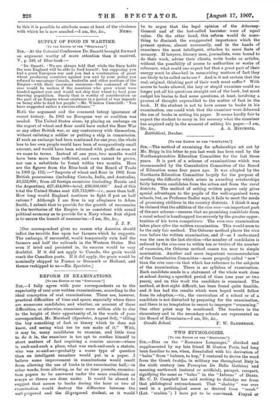SUPPLY OF FOOD IN WARTIME.
[TO THE EDITOR OF THE "SPECTATOR."] SIR,—At the Colonial Conference Dr. Smartt brought forward an argument worthy of more attention than it received, V., p. 349, of Blue-book :— " Dr. Smartt: We are always told that while the Navy holds the seas England will be able to feed herself ; but supposing you had a great European war and you had a -combination of great wheat producing countries against you and by your policy you refused to encourage Canada, Australia and other portions of the Empire—with their enormous resources—the command of the seas would be useless if the countries who grow wheat were banded against you and would not ship that wheat to feed your starving population. Surely that is worthy of• consideration on the part of an Empire whose existence in a period of war depends on being able to feed her people—Mr. Winston Churchill : 'You have suggested rather a curious alliance.'"
Both the argument and the comment betray ignorance of recent history. In 1902 no European war or coalition was needed. The United States alone, by placing an embargo on the export of wheat and flour could have ended the Boer War or any other British war, or any controversy with themselves, without enlisting a soldier or putting a ship in commission.
If such an embargo had been continued for one year, the whole loss to her own people would have been of comparatively small amount, and would have been returned with profit as soon as we came to terms. Instead of one year, two months would have been more than sufficient, and corn cannot be grown, nor can a substitute be found within two months. Here are the figures from the Blue-book of the Board of Trade in 1903 (p. 112) :—" Imports of wheat and flour in 1902 from British possessions (including Canada, India, and Australia), 28,552,000 ; from all foreign countries (including Russia and the Argentine), £27,454,000—total, £36,006,000." And of this total the United States sent £21,713,000-i.e., more than half. How long would England continue to fight if put on half rations ? Although I am firm in my allegiance to Adam Smith, I submit that to provide for the growth of necessaries in the territories of the Empire is as consistent with sound political economy as to provide for a Navy whose first object is to secure the transit of necessaries.—I am, Sir, &c., J. J. F.
[Our correspondent gives no reason why America should inflict the terrible fine upon her farmers which he suggests. The embargo, if successful, would temporarily ruin half the farmers and half the railroads in the Western States. But even if tried and persisted in, its success would be very
doubtful. If it did not apply to Canada, the grain would reach the Canadian ports. If it did apply, the grain would be nominally shipped to France or Denmark or Holland, and thence reshipped to us.—En. Spectator.]


































 Previous page
Previous page